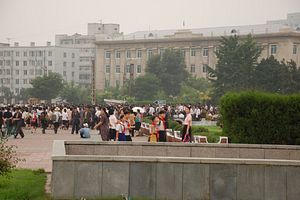U.S. Secretary of State Rex Tillerson seems to be locked in a downward spiral of irrelevance. Unavailable for public or media appearances, locked out of most of President Trump’s meetings with world leaders, and reportedly uninvolved in most foreign policy decision-making, Tillerson’s status in the Trump administration is uncertain. It is difficult to discern his larger aims, or the extent of his authority.
Tillerson’s travels this week to South Korea, Japan, and China put the situation in stark relief. His mission is cloaked in some mystery—and not the intriguing kind, more of the ‘Where’s Waldo?’ variety. It is not exactly clear what the overarching goals of his trip are, and in a marked departure from past practice of recent secretaries, he has barred media from accompanying him, prompting protests from the Washington press corps.
Tillerson’s inconspicuousness is remarkable given the high-profile nature of the trip. It comes in the midst of an increased North Korean belligerency and just after last week’s dramatic court affirmation of the impeachment of South Korea’s president, Park Geun-Hye. It will also be his first trip as secretary to a nondemocratic country, China. Tillerson seems to believe that klieg-lit diplomacy between the United States, China, and Japan—the world’s three largest economies—on matters as serious as a dangerous nuclear-armed renegade, can be carried out incommunicado.
Eyes will be on Tillerson for other reasons as well. After he was criticized during his confirmation hearings for not being vocal enough about other rights-abusing governments, Tillerson reportedly reassured members of Congress that he would embrace past U.S. foreign policy of speaking out about human rights abuses. Will he hold to that?
It is difficult to see how Tillerson can address human rights issues on China and North Korea, given that the Trump administration’s credibility has been hampered by its policies on refugees and immigration and Trump’s apparent apathy to international law and democratic norms.
But the scale and gravity of abuses in China and North Korea make silence impossible. The government in Beijing runs a repressive one party state that in recent years has been engaging in a broad crackdown on media and civil society. North Korea, meanwhile, is a totalitarian state that uses gulags and public executions to keep its population in a state of fear.
Tillerson could address these issues—and mitigate the damage of the Trump administration’s hostility and inconsistency on human rights—by being honest. He could, as past administrations have, acknowledge his government’s problematic record while highlighting international concerns about China’s and North Korea’s human rights abuses. He should, at least, try.
In any case, human rights issues need to be raised in the context of Tillerson’s meetings on Pyongyang’s aggressive nuclear detonations and recent missile tests. A recent U.N. Commission of Inquiry recommended that the U.N. Security Council consider referring North Korea to the International Criminal Court for crimes against humanity, and several U.S. allies on the Security Council—including Japan—agree that the matter should be debated, even in the face of certain Chinese and Russian vetoes. The US government may not be able to support that course of action, but Tillerson himself can raise his international profile by speaking candidly about how North Korea’s nuclear belligerency is linked to its human rights record.
After all, those links are real. North Korea routinely forces its citizens to engage in forced labor, including projects that benefit the military, and it is unthinkable that the country would even be pursuing a weapons program were it not what it is: a totalitarian society.
Tillerson should state clearly during the trip that Pyongyang’s crimes are not just a disaster for the people of North Korea: they also pose a threat to international peace and security. He should be enunciating clearly that the United States and international community want Pyongyang to disarm, but they also want the government to stop committing crimes against humanity against its own people.
The goal is not one outcome or the other, but both. On the practical front, Tillerson should be discussing with his counterparts in Seoul, Tokyo, and Beijing how U.N. sanctions can be augmented to include individuals and entities that may be complicit in human rights abuses.
After a timid start, Tillerson’s Asia trip is a chance for him to gain a new footing and raise his profile. Being bold and candid about human rights and regional geopolitics in Asia is as good a way as any. After all, this is part of his job as secretary of state. Given the growing questions about his role in the administration, he certainly doesn’t have anything to lose.
John Sifton is the Asia advocacy director at Human Rights Watch.

































